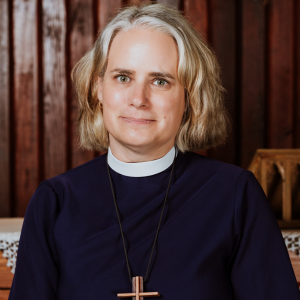At the end of September, our diocesan conference, We Together, was held in Nanaimo. In the opening address on the Friday night, I spoke about our diocese’s colonial history and about a distinction, outlined in the 2019 book The Promise of Anglicanism by Robert Heaney and William Sacks, between Anglicanism and Anglianism. This distinction is important and stems from the fact that the Anglican church is rooted in the English experience of being the state church. However, as Anglicanism has spread all over the world, it has consistently been, and continues to be, contextualized.
People in so many places, who speak many different languages, have made and continue to make Anglicanism their own. Prayer books, liturgies and hymns have been written in countless languages. Here in Canada, we have the Anglican Council of Indigenous Peoples and Sacred Circle, the self-governing Canadian Indigenous church. Here in this diocese, there is a Kwak’wala hymnal that dates from 2003 and continues to be used to this day. Taking the rich gifts and wisdom of the Anglican tradition and contextualizing and recontextualizing them for a particular time and place, culture and language, is Anglicanism at its best and is what we are called to do, here in this place, as a diocese.
But what we must let go of and repent is what Heaney and Sacks call Anglianism.
Anglianism, as the authors identify, was the effort to use the Anglican Communion to spread the Anglo-Saxon race. They quote Armitage Robinson, Dean of Westminster, who in 1908 said that the purpose of the Anglican Communion is “to express and guide the spiritual aspirations and activities of the Anglo-Saxon race.” Anglianism, dare I say, has been present in this diocese since the beginning. We were, after all, created in 1859 by Royal Letters Patent issued by Queen Victoria’s Colonial Office. Anglianism is what led us to participate in residential schools and other colonial efforts at genocide.
While Anglicanism is a beautiful gift, it is “catholicity from below. . . (and) its promise is its ongoing openness to contestation in inter-contextual presence and fellowship.” Anglicanism is beautiful and life-giving precisely in the myriad ways it is lived out and embodied across our vast communion because we are not afraid to contest our faith, our beliefs or our ways of being.
Conversely, Anglianism, like colonialism, relies on subjugation and domination, and should be rejected by any of us who are truly living into our baptismal covenant and our promise to respect the dignity of every human being.
As we finish out 2022 and enter into whatever 2023 brings, it is clear that the future is not going to look like the past. The world is changing, the church is changing, God is calling us to new ways of being. Let us go faithfully into an unknown future taking with us all the gifts of Anglicanism. But let us also recognize and repent against Anglianism, knowing that our God is a God of all peoples, languages and nations, calling us to live in right relation with one another and with the Earth.




